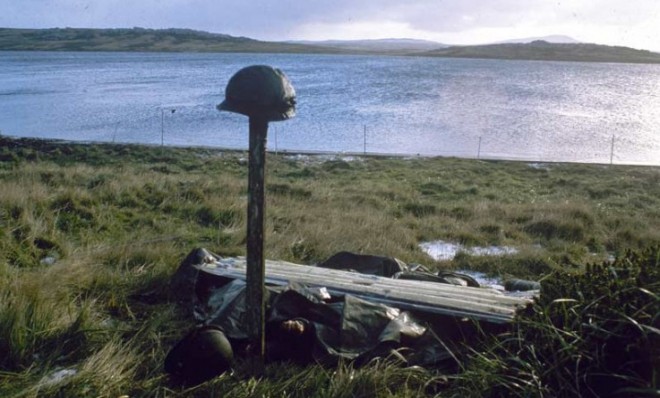Are Argentina and Britain headed toward a second Falklands War?
Populist Argentine President Cristina Fernandez is demanding that Britain return the Falkland Islands, the scene of an unfortunate 1980s standoff


A free daily email with the biggest news stories of the day – and the best features from TheWeek.com
You are now subscribed
Your newsletter sign-up was successful
In 1982, Argentine military ruler Gen. Leopoldo Galtieri sent a naval force to reclaim the Falkland Islands — called the Malvinas in Argentina — from Great Britain, and British Prime Minister Margaret Thatcher retaliated, sending the Royal Navy and other arms of the British military to recapture the sparsely populated islands. It was a real fight, and 907 people died — 649 Argentinians, 255 British fighters, and three Falklanders — over 74 tense days. Thirty-one years later, Argentine President Cristina Fernandez de Kirchner is demanding that British Prime Minister David Cameron peacefully hand back the Falklands, and Cameron has made it clear that he won't.
Fernandez made her claim in dramatic fashion, paying to publish an open letter to Cameron in several British newspapers on Jan. 3 — 180 years to the day, she said pointedly, that "in a blatant exercise of 19th century colonialism, Argentina was forcibly stripped of the Malvinas Islands, which are situated 14,000km (8,700 miles) away from London." Fernandez continued:
The Argentines on the Islands were expelled by the Royal Navy and the United Kingdom subsequently began a population implantation process similar to that applied to other territories under colonial rule. Since then, Britain, the colonial power, has refused to return the territories to the Argentine Republic, thus preventing it from restoring its territorial integrity. The Question of the Malvinas Islands is also a cause embraced by Latin America and by a vast majority of peoples and governments around the world that reject colonialism.
In 1960, the United Nations proclaimed the necessity of "bringing to an end colonialism in all its forms and manifestations". In 1965, the General Assembly adopted, with no votes against (not even by the United Kingdom), a resolution considering the Malvinas Islands a colonial case and inviting the two countries to negotiate a solution to the sovereignty dispute between them.... In the name of the Argentine people, I reiterate our invitation for us to abide by the resolutions of the United Nations.
Britain's Foreign Office is having none of Fernandez's call for talks, "strenuously" denying that it had expelled Argentinians in 1833 and insisting that any negotiations must involve the British islanders. "There are three parties to this debate, not just two as Argentina likes to pretend," a spokesman said. "There can be no negotiations on the sovereignty of the Falkland Islands unless and until such time as the Islanders so wish." Not coincidentally, the 3,000 inhabitants of the islands are voting in March on whether to remain a British territory. They have shown "a clear desire to remain British," Cameron's spokesman says, and Britain will "do everything to protect the interests of the Falklands islanders."
The Week
Escape your echo chamber. Get the facts behind the news, plus analysis from multiple perspectives.

Sign up for The Week's Free Newsletters
From our morning news briefing to a weekly Good News Newsletter, get the best of The Week delivered directly to your inbox.
From our morning news briefing to a weekly Good News Newsletter, get the best of The Week delivered directly to your inbox.
The broadside from Fernandez isn't totally unprovoked. Last month, Britain renamed a sizable chunk of Antarctica, parts of which are also claimed by Argentina and Chile, after Queen Elizabeth II, infuriating Buenos Aires. And now, the British press is in full jingoistic mode, with various degrees of chest-thumping. Fernandez's claims are "delusional and insulting," says former Thatcher aide Nile Gardiner at The Telegraph. Her "letter is stuffed full of falsehoods, and has no regard for reality." The only answer from Cameron "must be one of continued resolve and a firm pledge to defend the Falklands with robust force" if necessary. And this from Jonathan Wheatley at the Financial Times:
Fernandez — who has made confrontation a hallmark of her government in general — has enjoyed grandstanding on this issue, especially when it involves personal engagement with David Cameron.... Few can question that Britain's possession of the Falklands originated in an act of colonialism and right may even be on Argentina's side (though we doubt it). But possession is nine tenths of the law and Fernández, like General Galtieri, seems to miss the point that the more noise (especially violent noise) Argentina makes about the Falklands, the less the chance they will ever be handed over.
That's true, says Robert Munks at Jane's Intelligence Review. In the 1960s and '70s, Britain "was looking for ways to divest itself of these islands," and "were it not for the invasion, the likelihood is that Argentina by now would have some form of sovereignty over the Falklands." But everybody can relax a bit. This saber-rattling on both sides is probably aimed mostly at domestic audiences, especially in Argentina, where hard times have taken their toll on Fernandez's popularity. That's not to say there's no real tension between Britain and Argentina.
Relations are probably at their worst now than at any time since 1982 and the Falklands War. That's not to say there is any possibility of an armed conflict. There will not be another war.
A free daily email with the biggest news stories of the day – and the best features from TheWeek.com
Peter has worked as a news and culture writer and editor at The Week since the site's launch in 2008. He covers politics, world affairs, religion and cultural currents. His journalism career began as a copy editor at a financial newswire and has included editorial positions at The New York Times Magazine, Facts on File, and Oregon State University.
